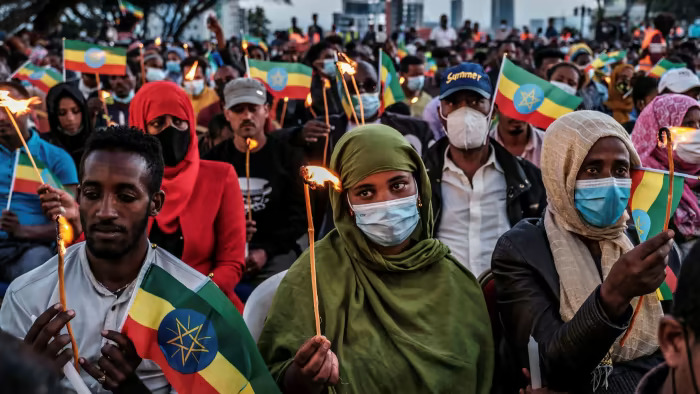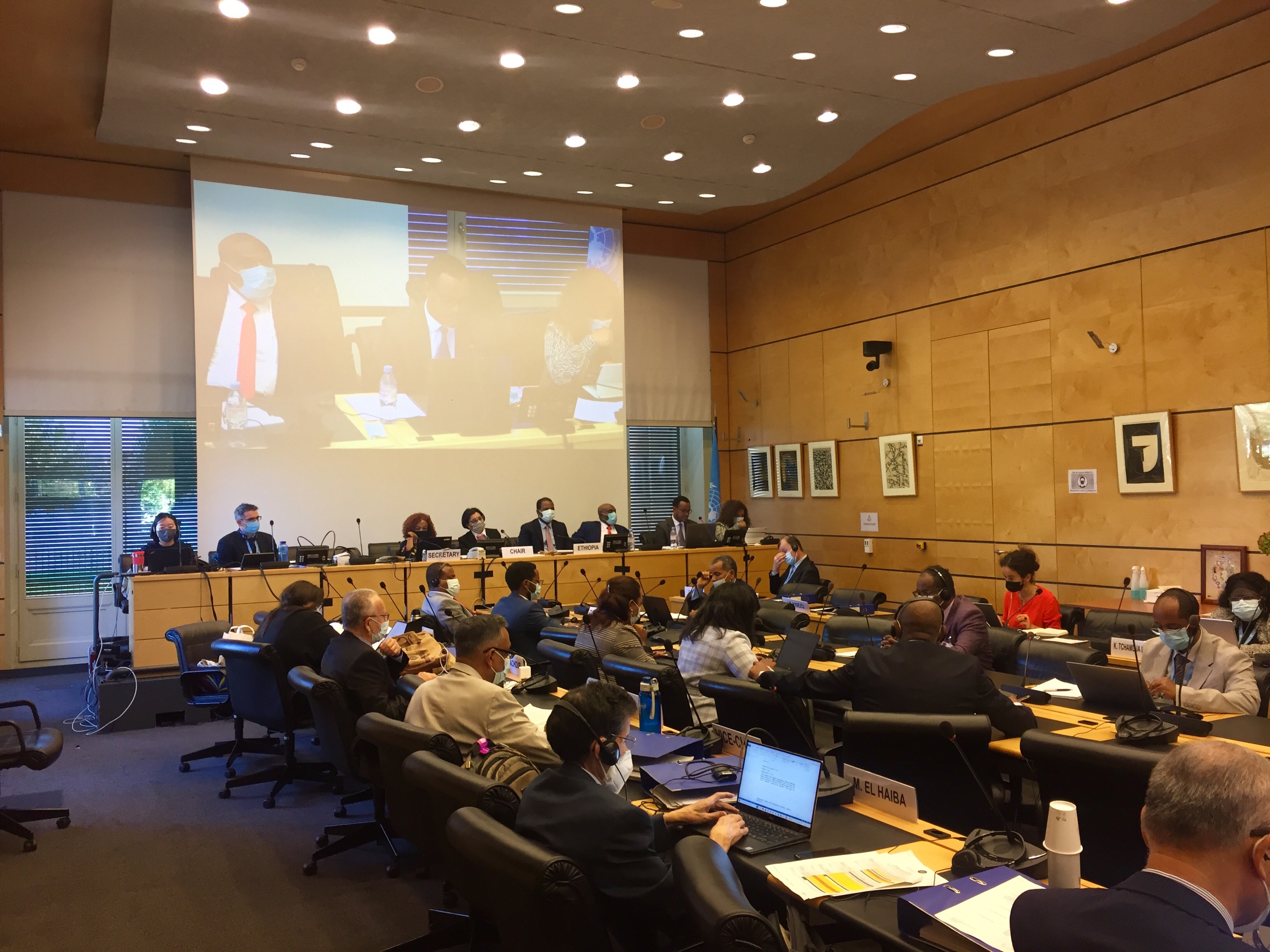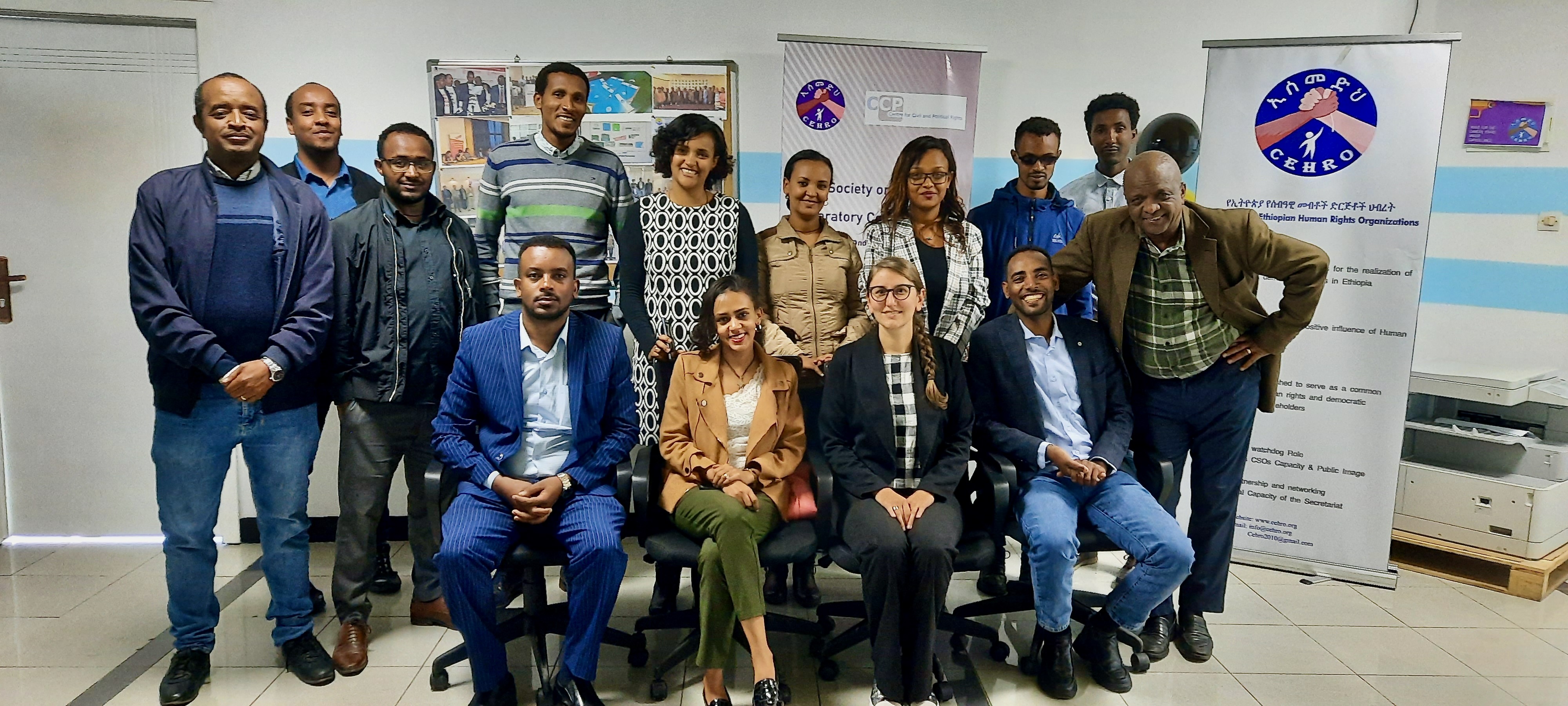Grave human rights violations and war crimes in the Tigray armed conflict in Ethiopia concern the Human Rights Committee
Published on 26 Oct 2022, 03:00 PM
Ethiopia was reviewed by the Human Rights Committee on 11 and 12 of October 2022
 Memorial service for the victims of the Tigray conflict in Addis Ababa, Ethiopia. By Eduardo Soteras/AFP/Getty
Memorial service for the victims of the Tigray conflict in Addis Ababa, Ethiopia. By Eduardo Soteras/AFP/Getty
The Human Rights Committee reviewed the second periodic report of Ethiopia on 11 and 12 of October 2022. CCPR-Centre conducted a preparatory mission in Ethiopia in September 2022 to inform civil society organizations, to coordinate their engagement, and to support the drafting of reports for the Committee’s 136th session.
In the opening statement, the State delegation considered the difficult context of Ethiopia, with three rounds of vicious wars and a former ruling political party. They also mentioned the tremendous suffering caused by the armed conflict in the Tigray region, which resumed after the Tigray People's Liberation Front (TPLF) violated the ceasefire established in 2021, and that the government of Ethiopia had always been ready to reform matters with TPFL. The delegation stressed the political will of the government to investigate perpetrators of grave human rights violations from both sides, and the fight for human dignity.
The Tigray conflict was a recurring topic that shaped the entire context of the dialogue. Key issues mentioned were sexual and gender-based violence and violence against women, the high number of arbitrary arrests and conditions of detainees, the rising ethnic tensions and conflicts in different regions of Ethiopia, and extrajudicial killings in the country.
Violence against women
Committee member Hélène Tigroudja mentioned violence against women in Ethiopia, with the most concerning topics being marital rape, polygamous and early marriages, and female genital mutilation (FGM). The Committee asked about the measures taken to remind all parties of the conflict of the need to protect civilian population against all forms of sexual and gender-based violence.
In this regard, the delegation replied that polygamic and FGM practices are criminalized. They follow a strategy of shaping public attitude through awareness-raising education, with promotional activities to disseminate the illegality and adverse effects of such harmful traditional practices. Moreover, various surveys conducted by the government indicate that the practice of FGM is decreasing, from 70% of women in 2005 to 65% in 2016. Regarding gender-based violence, the government has initiated a study to prepare and put in place a comprehensive legal framework. As for marital rape, they acknowledged that it is considered an exception to the legislation that criminalizes rape, but a national study concerning the gaps in legislation including in issues of gender-based violence and marital rape is underway.
Arbitrary detentions and liberty and security of persons
 Human Rights Committee reviewing Ethiopia during its 136th session
Human Rights Committee reviewing Ethiopia during its 136th session
Liberty and security of persons was also an issue of concern for the Committee. According to information received, between November 2021 and February 2022 there have been at least 11,000 arbitrary arrests in Ethiopia, including human rights defenders and journalists. The Committee asked about ensuring full access of ICRC and local NGOs to prisons to assess the conditions of detainees.
The delegation replied that pretrial detention was an exception in Ethiopia. They mentioned that, through the years, they had taken various measures to enhance the human treatment of detainees, with the expansion of all detention facilities, the access of prisoners to health care and other essential services, and capacity building training given to prison administrators. Moreover, human rights institutions had unlimited access to the facilities to visit the detainees, though, according to civil society, they needed prior authorizations for that, which would hamper the unlimited access.
Ethnic conflicts and refugees
Lastly, rights of minorities were mentioned. Ethnic-based killings by security forces and armed groups in Ethiopia have been widespread since 2018, and according to information received 450 Amharas were killed in the Oromia region on June 18 2022. The Committee stated that there seems to be no limit in the scale or amount of the violence, with victims ranging from newborns to the elderly, and asked about the measures taken to address ethnic tensions and conflicts, and to protect IDPs.
The delegation replied that Ethiopia never targeted civilians based on their identity, and that it was rather the TPLF who introduced ethnic-based tensions in the country and tried to spread violence among the groups. Nevertheless, according to independent reports, there are war crimes being committed on all sides of the conflict. Moreover, the Constitution of Ethiopia expressly gave equal recognition to all ethnic groups. Regarding refugees, the delegation replied that the crisis was a huge responsibility beyond the capacity of the country, and called on the international community to assist Ethiopia to address the challenges.
Watch again the dialogue with the Committee here (part one) and here (part two).
Recommendations of the Human Rights Committee
Concluding Observations on Ethiopia second periodic report were released on 3 November 2022. The State party is requested to provide, by 2025, information on the implementation of the following recommendations:
Violence against women and harmful practices
The State party should:
- (a) In regard to sexual and gender-based violence against women and girls in the context of the conflict in the north of the country, expedite implementation of the recommendations listed in the joint investigation report of the Office of the United Nations High Commissioner for Human Rights and the Ethiopian Human Rights Commission (2021), ensuring effective access to rehabilitation and redress for all victims of sexual and gender-based violence, and to prevent further violations;
- (b) Strengthen implementation of the National strategy on traditional harmful practices, and the National Roadmap to End Child Marriage and FGM/Cutting by 2025, including through targeted measures to address discriminatory attitudes at community level, including among actors of customary justice systems;
- (c) Strengthen measures aimed at ending polygamy and ensuring effective implementation of the legislation which proscribes it (article 11 of the Revised Family Code and article 650 of the Criminal Code), including through outreach and awarenessraising in rural areas where it is still prevalent. The State party should also support regional administrations in this endeavour, including by assisting in the development of appropriate legislation at the regional level where necessary;
- (d) Criminalise marital rape;
- (e) Provide members of the judiciary, prosecutors and law enforcement officials with effective training on women’s rights and on gender-sensitive investigation and interrogation procedures in cases of sexual and gender-based violence;
- (f) Collect and publish data on cases of sexual and gender-based violence
Right to life and protection of civilian populations
The State party should:
- (a) Conduct prompt, impartial and effective investigations into alleged violations of international human rights law and international humanitarian law committed in the context of the conflict in the Tigray region and surrounding areas, both by non-State and State actors, in order to identify, prosecute and punish those responsible, and ensure that victims have access to effective remedies and full reparation;
- (b) Take steps to increase the transparency of the investigations, including by publishing their findings;
- (c) Take appropriate measures to ensure the safety and security of the population affected by the conflict and to prevent violations of their human rights by any party to the conflict;
- (d) Ensure full and unconditional humanitarian access to all conflict-affected areas.
Freedom of expression
The State party should ensure that everyone can freely exercise the right to freedom of expression, in accordance with articles 19 of the Covenant and the Committee’s general comment No. 34 (2011) on the freedoms of opinion and expression. In doing so, it should:
- (a) Protect journalists, human rights defenders, government critics and activists against harassment, attacks or undue interference in the exercise of their professional activities or of their right to freedom of opinion and expression, and ensure that such acts are promptly, independently and thoroughly investigated and that those responsible are brought to justice and victims are provided with effective remedies;
- (b) End the practice of arresting, detaining and prosecuting journalists, human rights defenders, government critics and activists as a means of deterring or discouraging them from freely expressing their opinions, and immediately release those who are detained for merely exercising their right to freedom of expression;
- (c) Review and revise the Prevention and Suppression of Terrorism Crimes Proclamation No. 1176/2020 and the Hate Speech and Disinformation Prevention and Suppression Proclamation No.1185/2020 to avoid the use of vague terminology and overly broad restrictions on the right to freedom of expression;
- (d) Ensure that any restriction on access to Internet and phone services strictly adheres to the principles of legality, proportionality and necessity and is subject to independent oversight.
Here you can find all the recommendations given by the Committee in the Concluding Observations.
The follow-up report of Ethiopia on the implementation of the recommendations is due in 2025. The next list of issues will be adopted in 2028, and the next periodic report is due in 2029.
 Memorial service for the victims of the Tigray conflict in Addis Ababa, Ethiopia. By Eduardo Soteras/AFP/Getty
Memorial service for the victims of the Tigray conflict in Addis Ababa, Ethiopia. By Eduardo Soteras/AFP/Getty



